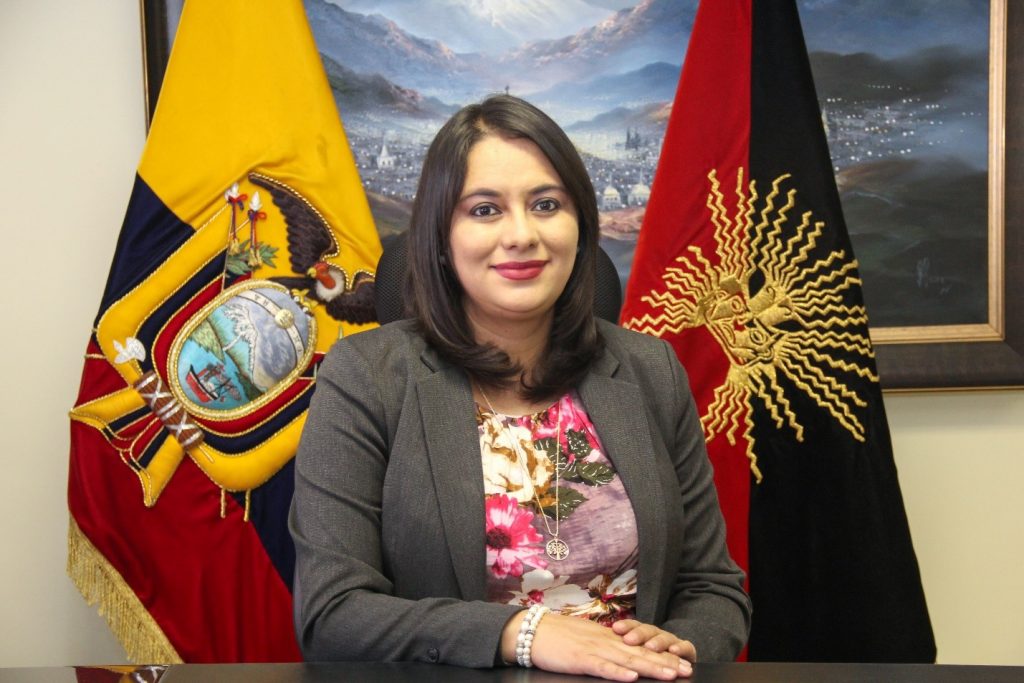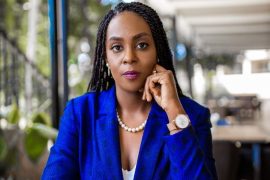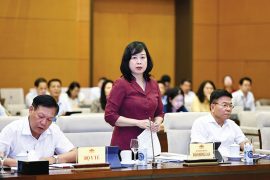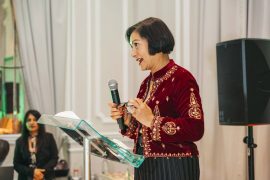A gender equal society with a framework in which both sexes have access to equal opportunities is one that every woman looks forward to. In this exclusive interview with Amazons Watch Magazine, the General Manager of Central Bank of Ecuador, Ms. Veronica Artola Jarrin, discusses the progress made in promoting gender equality in her country over the years and more. Excerpts:
- More than half of Ecuador’s population is made up of women. How would you rate the participation of women in socio-economic and political activities?
In recent years the gender equity has faced important improvements; however, it has a lengthy path ahead. The gap in gender equity has been bridging during the last 20 years, in Ecuador there are several examples that show the improvement in this topic. María Alejandra Vicuña is the second women in being nominated as Vice President of the Republic during Ecuador´s political history. Several local governments already have women as mayors and there are currently more women as candidates to assume positions of elected office.
The most important progress seen in Ecuador is observed at the National Assembly where the 38.69% of its members are women. The participation of women as heads of public institutions has increased, even in government bodies that were occupied by men through time, such as the Interior Ministry, Defense Ministry and the Central Bank of Ecuador.
But the gap still persists and in other areas it is more evident, the socio-economic situation of women is even disturbing. The last 20 years until 2016, have faced a phenomenon of poverty´s feminization, which is undoubtedly related to other problems such as the gap in wage and work. Women still work up to three times more than men, and much of that time, without any remuneration. There is a marked job insecurity in women, despite the fact that access to education gap had been closed, the labor market is still governed by gender-generic parameters that affects women. This cause that many women prefer to chose low-paid and precarious jobs where they are faced to labor exploitation, such domestic service or child care.
Additionally, the gender violence is still alarming in Ecuador, by 2011, one in four women had suffered some type of sexual assault and the current femicide situations have shocked the society. There are important gaps from the economic perspective, women are excluded from the financial system, economic violence and traditional roles still limiting the participation of women in the economic field.
- Ecuador has over the years maintained economic stability rising in ranks among other Southern American countries. What will you say is responsible for this?
The management and financing model in recent years has focused on taking advantage of the positive externalities presented in the world economy, especially the ones related to the high price of commodities, which were channeled into public investment to generate the necessary conditions, in particular in infrastructure to boost private investment.
In this regard, public management played an important role in the economy and fostered the dynamism of a large part of the economic sectors, promoting public purchases to Ecuadorian suppliers, the incorporation of capital goods and national raw material into strategic projects of the State and the articulation of public and private actors, and universities and popular economy actors as well.
In this context, the Central Bank of Ecuador has searched for the proper functioning of the monetary and financial system through the optimal administration of liquidity and economic flows, protecting the systemic stability and promoting the access of the population to credit and financial services.
Currently, we are faced with a new macroeconomic scenario where it is evident the necessity to take advantage of the conditions previously generated in the benefit of the private sector. Meanwhile the public sector should focus its management towards efficiency of the resources that were previously provided and look for new actions and tools that allow us to cope with a less favorable economic outlook for our country, since the price of commodities has shown a lower price level and it has been complemented by the appreciation of the dollar and unfortunately we had to manage non-predictable natural events, such as the April 16, 2016 earthquake.
In this way, we believe the productive sector will be decisive (as it has always been, but now with greater emphasis) in pursuing national objectives and thus the economic situation. Therefore, we have seen the need to articulate spaces and actions aimed at this objective, such as the disclosure of the “Organic Law of incentives for public-private partnerships” and the “Organic Law for productive promotion”, which are aimed to a healthy articulation between the public and the private sector.
- In your opinion, what are some of the trade policies which can be put in place to boost economic growth?
We are looking to generate opportunities for the development of our exports and therefore achieve our national objectives like: the productive diversification based on the incorporation of added value, in the impulse of exports; its expansion in products and destinations, and import substitution; the inclusion of actors and the continuous improvement of productivity and competitiveness, in a transversal way in all sectors of the economy. In this sense, it is possible to analyze a greater commercial openness to the world, focused towards economic recovery, so the best strategies are being analyzed to initiate relations with blocs of nations with which we can count on synergies that mutually benefit us.
It is important to note that non-oil exports as a component of the total exports of Ecuador, have emerged strongly in the last ten years, showing a greater participation in the total composition of the goods sent abroad. In 2008, non-oil exports accounted for 38%, while the weight of oil exports amounted to 62%. On the contrary, in 2017 a structural change in the economy was reflected, since 64% corresponded to non-oil exports
Although, it is necessary to continue working on the diversification and positioning of our products and services at international level, there is still evidence of a predominance of primary products (especially banana and shrimp),and the quality and global acceptance of our products compel us to support our national production through the modernization and aggregation of value to our products. This should be complemented with the management of attraction and promotion of investments, in line with the development of objectives and strategies for the generation of employment and promotion through the income of currencies.
What is previously mentioned is articulated and implemented through the policies projected in the national development plan called “Plan toda una vida”, aimed at boosting productivity and competitiveness for sustainable economic growth in are distributive and solidarity way.
- The Central Bank of Ecuador has put in place an institution which supports pregnant and breastfeeding women. What specific occurrences prompted this move?
The Central Bank of Ecuador permanently advocates actions that allow the promotion of a positive working culture, as well as promoting the improvement in the living and working conditions of those who are part of the entity. We are committed to build a proactive, empowered and socially responsible organizational culture. On the basis of this challenge, the institution has worked from various points, in which the promotion of gender equity has been addressed as a priority and integral strategy plan of the Bank.
Consistent with this line of action, in July 2017, I arranged the implementation of a lactation area in the bank, knowing the importance of breastfeeding to contribute to the gender equity strategy and ensure compliance with the rights of female workers in postpartum period. To date, among the bank officials we have 216 women of childbearing age, 8 are pregnant and 13 in breastfeeding period, which could benefit from this space. Among them I am one who will be a user of this area because last Thursday October 25, I gave birth to my little daughter Paula, who will also be a direct beneficiary of the lactation area of the Central bank.
This space is certified by the Ministry of Public Health due to compliance of high sanitary and technical standards, but also because it is a cozy, quiet and luminous place, where it will be a pleasure and joy for me to feed my beloved daughter.
- In recent times, women protested several injustices from workplace marginalization to assaults of different kinds. How best do you think the rights of women can be protected?
One can protect women’s rights first of all, through acknowledgement, awareness raising and self appropriation, that is, as women, demanding respect of rights and educating children and men to do the same. Also, there must be punitive action against those who disrespect these rights, and the act of filing a claim should count on clear means of communication.
I am one of the few women around the world, at the head office of a Central Bank. It seems we are only a bit over twenty in total, and I have recently given birth to my little baby girl, Paula. It is appalling to see at a local, but also international scale, the impact caused by a female Governor of a Central Bank being pregnant and exercising her right to go on maternity leave, when this is something natural and it’s a basic right; maybe even at the basis for the existence of human race. Nowadays it is still a step forward to see a high official simply benefiting from a right and that alone lets on that there is still a lot of work to be done. Hopefully these small examples make an impact on society, making it every time more natural to see women exercising rights such as maternity leave, and generating no criticism or amazement.
When we stand up for our rights, we’re also standing up for the rights of other women.
On the other hand, to make other women’s rights true, facilities must be given for them to be effective. During my time in office at the Central Bank of Ecuador, I have worked widely around the country with events and round-table discussions, aside from promoting research on gender equity from economics. This way, we further respect to women’s economic rights and gender equity and we reassert our total rejection to gender violence.
As a final step, we’ve set forward a ten-million-dollar fund for women that are currently suffering abuse, to finance entrepreneurship, thus providing them with a tool to effectively leave that circle of violence through self-generating income. This is key from a women’s right perspective, because it creates tools that allow effective enforcement of these rights.
- To which of your career experiences do you credit your quality service and outstanding work ethics as Chief Executive Officer of the Central Bank of Ecuador?
My professional career has being closely linked to the Central Bank of Ecuador for a very long time. I started working in this institution over fifteen years ago as a young professional of the Studies Department and was later promoted to other positions that demanded more responsibilities.
Being part of this institution and to have been considered to hold such positions, is the result of an arduous effort, but also of the opportunities that were given to me by an institution that treasures commitment and professionalism beyond one’s gender. It is precisely this tight link to the Central Bank of Ecuador that has motivated me to always give the best of myself in this important task that I have been assigned.
This experience in the Central Bank of Ecuador, added up to other high responsibility positions that I’ve held as public server[1] and in several working areas that include public policy configuration and effective implementation, have restated my commitment with community service. I believe this is expressed through empathy, transparency, efficiency and ethics. A service-minded attitude and a high sense of professional ethics are a condition, but not the outcome of a successful professional experience, which is why they should be applied on every task that we perform.
QUOTE: The most important progress seen in Ecuador is observed at the National Assembly where the 38.69% of its members are women. The participation of women as heads of public institutions has increased.




